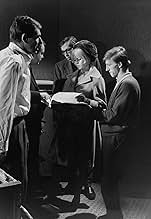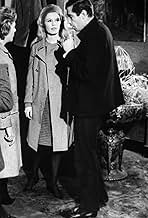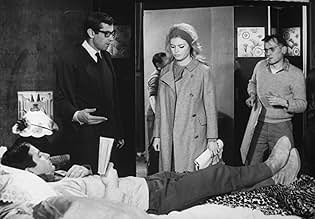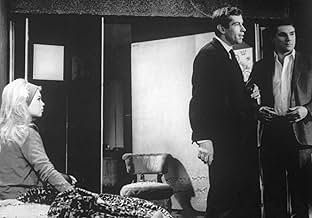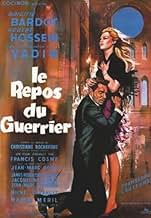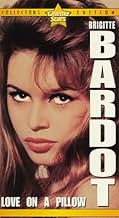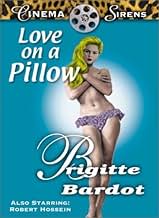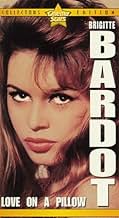A young girl rescues a man from a suicide attempt. He turns out to be a sociopath, who begins to take over her life, abusing her both verbally and emotionally, yet she can't seem to tear her... Read allA young girl rescues a man from a suicide attempt. He turns out to be a sociopath, who begins to take over her life, abusing her both verbally and emotionally, yet she can't seem to tear herself away from him.A young girl rescues a man from a suicide attempt. He turns out to be a sociopath, who begins to take over her life, abusing her both verbally and emotionally, yet she can't seem to tear herself away from him.
- Director
- Writers
- Stars
Macha Méril
- Raphaële
- (as Macha Meril)
Georges Aminel
- Katov
- (voice)
Yves Barsacq
- Le patron de l'hôtel
- (uncredited)
Hélène Dieudonné
- Madame Pia - la concierge
- (uncredited)
Jean Lefebvre
- Armand
- (uncredited)
Paul Mercey
- Le gros serveur
- (uncredited)
Robert Seller
- Le vieil homme dans le train
- (uncredited)
- Director
- Writers
- All cast & crew
- Production, box office & more at IMDbPro
Featured reviews
The title of my review ought to be enough to scare off the folks who are expecting a plot-driven, digestible story. You'll get none of that here.
Although there is indeed a plot (a rather interesting one, if you ask me), the power of this film lies not in the story but in the script and in the subtle, almost indecipherable fragments of philosophy we experience through these two highly complex characters.
Geneviève (Bardot) is the the romantic. Her counterpart Renaud (Hossein) is the cynic. The collision of their worlds causes a catastrophic upheaval in both of their lives. But it is undeniable that they need each other, just as the two opposing philosophies rely on each other. Sort of a yin-yang thing. At times they are at war with each other; at times they cling to each other for life; at times they threaten to annihilate the other absolutely. This is some really heavy stuff that cannot possibly be summarized in a few paragraphs, so I won't even try.
There are several monologues which are so stirring I want to learn them by heart. Particularly the last two speeches in the final 10 mins of the film. Pay close attention to those words, because they sum up the entire theme of the film. Powerful. Powerful.
Although there is indeed a plot (a rather interesting one, if you ask me), the power of this film lies not in the story but in the script and in the subtle, almost indecipherable fragments of philosophy we experience through these two highly complex characters.
Geneviève (Bardot) is the the romantic. Her counterpart Renaud (Hossein) is the cynic. The collision of their worlds causes a catastrophic upheaval in both of their lives. But it is undeniable that they need each other, just as the two opposing philosophies rely on each other. Sort of a yin-yang thing. At times they are at war with each other; at times they cling to each other for life; at times they threaten to annihilate the other absolutely. This is some really heavy stuff that cannot possibly be summarized in a few paragraphs, so I won't even try.
There are several monologues which are so stirring I want to learn them by heart. Particularly the last two speeches in the final 10 mins of the film. Pay close attention to those words, because they sum up the entire theme of the film. Powerful. Powerful.
This is not a great film and not even as good as Vadim clearly thought it would be but it is still likable. Indeed there is much to like, even if Bardot is already past her absolute best look she carries herself well enough and there are glimpses of her beauty. Unfortunately she does not play little miss suburban boring, convincingly and her co-star, Robert Hossein doesn't really begin to cut it as the anarchist/existentialist, and yet
There are very good moments and when Hossein insists on leaving and she chase him to argue her 'love' there is real frisson. Similarly in the terrible moment when he insists on walking from her to take a prostitute, we are drawn immediately into their mutual dilemma. Unfortunately the film does not have the courage of it's convictions or possibly Vadim did not even have enough awareness of his subject, either way this is a great idea for a film yet to be made.
This film seems like more than just a film, it looks and feels like what it would have really have been like to have Brigitte Bardot as your companion in life, for better and for a lot worse, as relationships go. Qualities such as loyalty, caring, warmth, tenderness, understanding, devotion, etc. endlessly flow from her to her suicidal, live-in lover, as time and again she brings him back from the depths of despair and self-destruction, to temporary recovery in her arms.
All this, however, serves to make him even more miserable, in the best masochistic tradition, as he falls even more deeply into his alcoholic albatross, rather than face real life responsibility as a sober, productive man with a good woman by his side.
Bardot exudes the utmost maturity and restraint in taking the best cheap shots this ungrateful con-artist, female user, and abusive man (Robert Hossein, in an outstanding interpretation of a difficult role) can dump on her. The problem here is universal in scope in that it portrays two people who are physically attracted to each other, to the point of addiction, while at the same time a classic mis-match from a values and a psychological perspective. "You always hurt the one you love," was never more in evidence than for the 102 emotion-draining minutes of this film. Clearly a Vadim masterpiece, and a triumphant collaboration with Bardot, long after their real-life divorce and her remarriage. This represents "professionalism" to the highest degree.
All this, however, serves to make him even more miserable, in the best masochistic tradition, as he falls even more deeply into his alcoholic albatross, rather than face real life responsibility as a sober, productive man with a good woman by his side.
Bardot exudes the utmost maturity and restraint in taking the best cheap shots this ungrateful con-artist, female user, and abusive man (Robert Hossein, in an outstanding interpretation of a difficult role) can dump on her. The problem here is universal in scope in that it portrays two people who are physically attracted to each other, to the point of addiction, while at the same time a classic mis-match from a values and a psychological perspective. "You always hurt the one you love," was never more in evidence than for the 102 emotion-draining minutes of this film. Clearly a Vadim masterpiece, and a triumphant collaboration with Bardot, long after their real-life divorce and her remarriage. This represents "professionalism" to the highest degree.
While their short-lived marriage was long gone, this is the fourth of five Roger Vadim/Brigitte Bardot collaborations and only the second I've watched myself. After opening in a light comedy vein, this rather scrappy film turns into an unappetizingly ponderous melodrama on the lines of LA DOLCE VITA (1960), complete with a risibly "beat" orgy sequence and a surfeit of pretentious chat; nevertheless, the whole is somewhat redeemed by the attractive Italian locations in its second half and the nice musical score throughout.
For what it's worth, it tells of a bourgeois girl (Bardot) shortly to be married to an unassuming young man travelling from Paris to Dijon to hear the will of her late aunt, who accidentally stumbles on the suicide attempt of a bohemian, pulp-thriller-loving misanthrope (Robert Hossein) who, upon recovering, literally turns her life upside down. The cast is completed by James Robertson Justice (as Hossein's sculptor friend), Macha Meril (as Robertson's tramp companion) and, in one sequence, Michel Serrault as a notary.
In the end, the original title of THE WARRIOR'S REST sounds far more interesting that what's on offer here and the fact that I was misinformed about the film's running time I thought it was a good 22 minutes shorter! did not help to earn it much affection from my end. But, then, the sight of Bardot in her prime (and, Vadim being Vadim, in various stages of undress as well) is always welcome...
For what it's worth, it tells of a bourgeois girl (Bardot) shortly to be married to an unassuming young man travelling from Paris to Dijon to hear the will of her late aunt, who accidentally stumbles on the suicide attempt of a bohemian, pulp-thriller-loving misanthrope (Robert Hossein) who, upon recovering, literally turns her life upside down. The cast is completed by James Robertson Justice (as Hossein's sculptor friend), Macha Meril (as Robertson's tramp companion) and, in one sequence, Michel Serrault as a notary.
In the end, the original title of THE WARRIOR'S REST sounds far more interesting that what's on offer here and the fact that I was misinformed about the film's running time I thought it was a good 22 minutes shorter! did not help to earn it much affection from my end. But, then, the sight of Bardot in her prime (and, Vadim being Vadim, in various stages of undress as well) is always welcome...
"Love On a Pillow" is a dubbed French film starring Brigitte Bardot at her most beautiful and alluring. An existentialist writer, artist, and musician from Paris attempts suicide in Dijon. He is saved when a lovely young Parisian girl, in town to claim a substantial inheritance left her by a rich aunt, mistakenly opens his hotel room door and finds him near death from an overdose of sleeping pills. Thereafter, he becomes her responsibility, they fall in love, and his abject alcoholism and stubborn cynicism both torment and liberate her. In the process, we see her transformed from an attractive young woman into a sexy beat hipster, and finally into a ravishing goddess who defines feminine beauty. It is very evident in this film why Bardot was considered one of the most captivating actresses of the early sixties. Particularly toward the end of the movie, there are closeups of her that take your breath away. The film's setting is very interesting, as well -- among artists and jazz musicians in Paris in the early sixties. The score is simple but ethereal. There is one touching scene in a café in Florence where the lovers are momentarily content and at peace. A guitarist approaches their table singing a pretty Italian love ballad. The man appears annoyed, then in a sudden outburst, chases away the musician because "that song has memories." The incident may reveal what is really bothering him. At the conclusion, the film's understated score moves to a poignant crescendo. "Love On a Pillow" is not just a beautiful film. It is easily Bardot's finest effort.
Did you know
- TriviaThe encore for this film, composed by Michel Magne, was later used in 1968 by Frida Boccara in her single "Cent Mille Chansons". This version, now with lyrics, was written by Eddy Marnay.
- Quotes
Renaud Sarti: Our lives on this earth are pointless.
Geneviève Le Theil: Speak for yourself.
Renaud Sarti: I am.
- ConnectionsFeatured in Le mystère Bardot (2012)
- How long is Love on a Pillow?Powered by Alexa
Details
- Runtime1 hour 42 minutes
- Aspect ratio
- 2.35 : 1
Contribute to this page
Suggest an edit or add missing content


